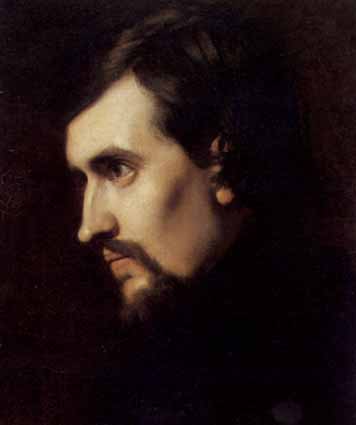
Gounod was born in Paris, the son of a pianist mother and an artist father. His mother was his first piano teacher. Under her tutelage, Gounod first showed his musical talents. He entered the Paris Conservatoire where he studied under Fromental Halévy and Pierre Zimmermann (he later married Zimmermann's daughter). In 1839, he won the Prix de Rome for his cantata Fernand. In this, he was following in his father's footsteps; François-Louis Gounod (d. 1823) had won the second Prix de Rome in painting in 1783. He subsequently went to Italy where he studied the music of Palestrina. He concentrated on religious music of the sixteenth century. Around 1846-47 Gounod began studying for the priesthood but changed his mind and went back to composition.. In February 1848, Gounod returned to civil life and began the composition of a "Messe Solennelle", also known as the "Saint Cecilia Mass". Two parts of this work were first performed in London during 1851 and began his reputation as a noteworthy composer. He wrote two symphonies in 1855. His Symphony No. 1 in D major was the inspiration for the Symphony in C, composed later that same year by Georges Bizet, who was then Gounod's 17 year old student. Despite their charm and brilliance, Gounod's symphonies are seldom performed. Recordings of the symphonies include those by Michel Plasson conducting the Orchestre national du Capitole de Toulouse and Sir Neville Marriner with the Academy of St. Martin in the Fields for Philips Records. Gounod wrote his first opera, Sapho, in 1851, but had no great success until Faust (1859), based on the play by Goethe. This remains his best-known work. The romantic and highly melodious Roméo et Juliette (based on the Shakespeare play), premiered in 1867, is also performed and recorded regularly. The charming and highly individual Mireille of 1864 is admired by connoisseurs. There was a minor controversy surrounding Faust. Many critics believed it was a great advancement over Gounod's previous works, but one critic went so far as to state his doubt that Gounod composed it, which prompted Gounod to challenge the critic to a duel. The critic withdrew his statement. From 1870 to 1874 Gounod lived in England, becoming the first conductor of what is now the Royal Choral Society. Much of Gounod's music from this time is vocal or choral in nature. He became entangled with the amateur English singer Georgina Weldon, a relationship which ended in considerable acrimony. Fanny Mendelssohn introduced the keyboard music of J. S. Bach to Gounod, who came to idolize Bach tremendously. For him, The Well-Tempered Clavier was "the law to pianoforte study ... the unquestioned textbook of musical composition". Later in his life, Gounod returned to his early religious impulses, writing much religious music. His earlier work included an improvisation of a melody over the C major Prelude (BWV 846) from The Well-Tempered Clavier, to which in 1859 Gounod set the words of Ave Maria, resulting in his composition Ave Maria, a setting that became world-famous.. He also wrote a Pontifical Anthem, now the official national anthem of the Vatican City. He also wanted to compose his Messe à la mémoire de Jeanne d'Arc while kneeling on the stone on which Joan of Arc knelt at the coronation of Charles VII of France. A spiritual man and devout Catholic, Gounod's piano had a music-rack in which was carved an image of the face of Jesus. He was made a Grand Officer of the Légion d'honneur in July 1888. He died in 1893 in Saint-Cloud, France, as (according to the legend) he put the finishing touches to a requiem "Le Grand Requiem" inspired by the death of his grandson, a major work which he was never to hear performed. One of his short pieces, Funeral March of a Marionette, became well known as the theme to Alfred Hitchcock Presents.
Source : © Wikipedia
Free sheet music
|